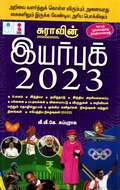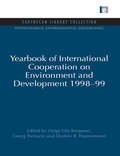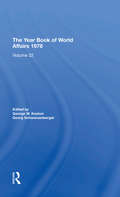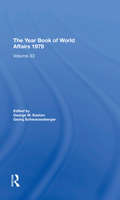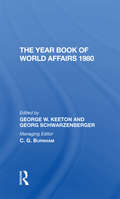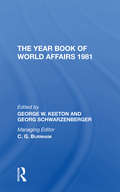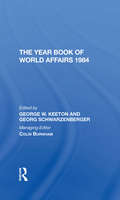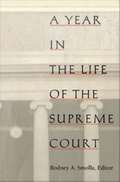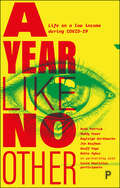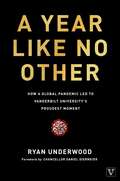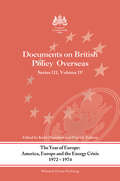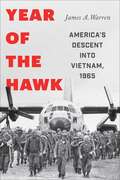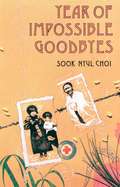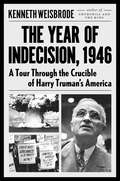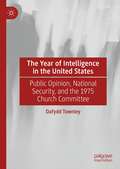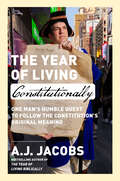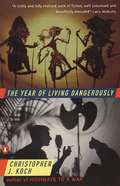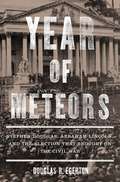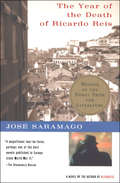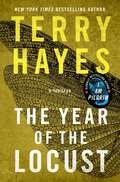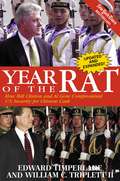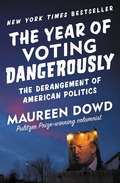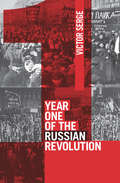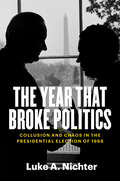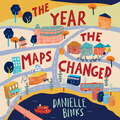- Table View
- List View
Year Book 2023: ஆண்டு புத்தகம் 2023
by V. V. K. Suburasuஇந்த புத்தகம் போட்டி கொள்ளும் முறைகளுக்கு என்றும் அதிக முக்கியமானது மற்றும் அனைத்து அறிவு விகாரிகளுக்கும் அந்தச் சொற்கள் உள்ளன. குறித்து இந்த புத்தகத்தில் உலகம், இந்தியா, பட்டியல்கள், விளையாட்டுகள் மற்றும் விருதுகளைக் கொண்டு அனைத்து வழிகளும் கொண்டுள்ளது. அதனை கொண்டாட எல்லாருக்கும் இந்த புத்தகம் ஒரு அரிய பருவமாக உள்ளது.
Year Book of International Co-operation on Environment and Development (International Environmental Governance Set)
by Helge Ole Bergesen Georg Parmann Oystein B. ThommessenThis eighth annual edition analyzes the international community's position on specific environment and development problems, the main obstacles to effective international solutions, and how to overcome them. It assesses both the achievements and shortcomings of co-operation, distinguishing between the rhetoric and the reality of environmental world politics.
The Year Book Of World Affairs, 1978
by Georg Schwarzenberger George W. KeetonThis annual survey is devoted to the attitudes of participating States in Europe towards the objective of promoting detente, bringing together references to World affairs examined in the past which have particular relevance.
The Year Book Of World Affairs, 1979
by Georg Schwarzenberger George W. KeetonThis book, under the auspices of the London Institute of World Affairs, aims to provide an independent international forum for the constructive criticism of, and research into, world affairs 1979.
The Year Book Of World Affairs, 1980
by Georg Schwarzenberger George W. KeetonThis year book presents an annual survey to bring together references to themes examined in the past which have particular current relevance. It provides information on international affairs having a stereotyped and repetitive character for anticipating a "new" happening, or "modern" development.
The Year Book Of World Affairs, 1981
by Georg Schwarzenberger George W. KeetonFirst published in 1981. The Council of the London Institute of World Affairs has carefully reconsidered the lessons to be drawn from the Institute's record in its first half-century and reshaped its plans of activities for the 1980s. As in an earlier "cold peace" era, the Council is united in its resolve not to be taken by surprise by any of the contingencies that, on a darkening world scene , must be anticipated in medium-range planning.
The Year Book Of World Affairs 1984
by George W Keeton Georg SchwarzenbergerFirst published in 1984. The final volume. The Council of the London Institute of World Affairs has carefully reconsidered the lessons to be drawn from the Institute's record in its first half-century and reshaped its plans of activities for the 1980s. As in an earlier "cold peace" era, the Council is united in its resolve not to be taken by surprise by any of the contingencies that, on a darkening world scene , must be anticipated in medium-range planning. It is thus only in keeping with comparable action taken in earlier phases of the Institute's existence that the Council has decided to suspend the publication of the Year Book after this Volume .
A Year in the Life of the Supreme Court
by Paul Barrett Richard Carelli Marcia Coyle Lyle Denniston Aaron Epstein Kay Kindred Tony Mauro David Savage Stephen WermielDespite its importance to the life of the nation and all its citizens, the Supreme Court remains a mystery to most Americans, its workings widely felt but rarely seen firsthand. In this book, journalists who cover the Court--acting as the eyes and ears of not just the American people, but the Constitution itself--give us a rare close look into its proceedings, the people behind them, and the complex, often fascinating ways in which justice is ultimately served. Their narratives form an intimate account of a year in the life of the Supreme Court. The cases heard by the Surpreme Court are, first and foremost, disputes involving real people with actual stories. The accidents and twists of circumstance that have brought these people to the last resort of litigation can make for compelling drama. The contributors to this volume bring these dramatic stories to life, using them as a backdrop for the larger issues of law and social policy that constitute the Court's business: abortion, separation of church and state, freedom of speech, the right of privacy, crime, violence, discrimination, and the death penalty. In the course of these narratives, the authors describe the personalities and jurisprudential leanings of the various Justices, explaining how the interplay of these characters and theories about the Constitution interact to influence the Court's decisions. Highly readable and richly informative, this book offers an unusually clear and comprehensive portrait of one of the most influential institutions in modern American life.
A Year Like No Other: Life on a Low Income during COVID-19
by Ruth Patrick Maddy Power Kayleigh Garthwaite Jim Kaufman Geoff Page Katie PybusMoney was already tight for UK families living on a low income before the COVID-19 pandemic, but national lockdowns made life much harder. Telling the stories of these families, this book exposes the ways that pre-existing inequalities, insecurities and hardships were amplified during the pandemic for families who were already in poverty before COVID-19, as well as those pushed into poverty by the economic fallout it created. Drawing on the Covid Realities research programme, and developed in partnership with parents and carers, it explores experiences of home-schooling, social security receipt and government, community and charitable support. This book sets out all that is wrong with the status quo, while also offering a powerful agenda for change. Also see ‘COVID-19 Collaborations: Researching Poverty and Low-Income Family Life during the Pandemic’ (Open Access) to find out more about the challenges of carrying out research during COVID-19.
A Year Like No Other: How a Global Pandemic Led to Vanderbilt University's Proudest Moment
by Ryan UnderwoodThe University that was at the heart of the research to discover the vaccines for the pandemic pens the story of how it all happened.In 2020, as COVID-19 threw the U.S. higher education system into turmoil, university administrators around the country debated whether it was prudent—or even possible—to teach students in person or conduct laboratory research amid a once-in-a-century pandemic. For the leadership at Vanderbilt University, the answer to the question was a resounding Yes. Viewing residential education and collaborative research as essential to its academic and societal mission, Vanderbilt was one of a small number of America&’s top universities to put rigorous safety protocols in place to allow students, faculty, and research personnel back to campus in the fall. Told with recollections and insights from Vanderbilt&’s leaders, students, faculty, and staff, and moving at a pace matching the events it describes, A Year Like No Other takes readers from Vanderbilt&’s near-shutdown in the spring through its reopening for the 2020–2021 academic year, providing an inside look at how the university coped not only with COVID-19, but also with a tragic night of tornadoes and the urgent calls for racial justice following the killing of George Floyd. A Year Like No Other also highlights some of the vital contributions that faculty at Vanderbilt and Vanderbilt University Medical Center have made to the development of COVID-19 vaccines and therapies, with research fueled in part by Dolly Parton, the beloved country music legend. A Year Like No Other captures a singular moment in the university&’s history while delivering a concise portrait of successful crisis management playing out amid the fast-changing circumstances of global health threats and a barrage of local hardships.
The Year of Europe: Documents on British Policy Overseas, Series III Volume IV (Whitehall Histories Ser. #Vol. Iii)
by Keith Hamilton Patrick Salmon Christopher Baxter Alastair NobleThis is the latest volume of Documents on British Policy Overseas and the first in the series to be produced in electronic format, covering the principal themes of: the European Union, transatlantic divisions, war in the Middle East and the diplomacy of the energy crisis. Edited and selected by Foreign and Commonwealth Office historians, it consist
Year Of The Hawk: America's Descent into Vietnam, 1965
by James A. WarrenFrom a celebrated military historian, a powerful account of the most pivotal year of the Vietnam War—the cataclysm that forever changed America.The Vietnam War was the greatest disaster in the history of American foreign policy. The conflict shook the nation to its foundations, exacerbating already deep cleavages in American society, and left the country baffled and ambivalent about its role in the world. Year of the Hawk is a military and political history of the war in Vietnam during 1965—the pivotal first year of the American conflict, when the United States decided to intervene directly with combat units in a struggle between communist and pro-Western forces in South Vietnam that had raged on and off for twenty years. By December 1965, a powerful communist offensive had been turned back, and the US Army had prevailed in one of the most dramatic battles in American military history, but nonetheless there were many signs and portents that US involvement would soon slide toward the tipping point of tragedy. Vividly interweaving events in the US capital with action in Southeast Asia, historian James A. Warren explores the mindsets and strategies of the adversaries and concludes that, in the end, Washington was not so much outfought in Vietnam as outthought by revolutionaries pursuing a brilliant protracted war strategy. Based on new research, Year of the Hawk offers fresh insight into how a nationalist movement led by communists in a small country defeated the most powerful nation on earth.
Year of Impossible Goodbyes
by Sook Nyul ChoiThis autobiographical story tells of ten-year-old Sookan and her family's suffering and humiliation in Korea, first under Japanese rule and after the Russians invade, and of a harrowing escape to South Korea.
The Year of Indecision, 1946
by Kenneth WeisbrodeA vivid account of America at the pivot point of the postwar era, Harry Truman's first full year in office In 1946, America had just exited the biggest war in modern history and was about to enter another of a kind no one had fought before. We think of this moment as the brilliant start of America Triumphant, in world politics and economics. But the reality is murkier: 1946 brought tension between industry and labor, political disunity, bad veteran morale, housing crises, inflation, a Soviet menace--all shadowed by an indecisiveness that would plague decision makers who would waffle between engagement and isolation, as the country itself pivoted between prosperity and retrenchment, through the rest of the century. The Year of Indecision, 1946 overturns the image of Truman as a can-do leader--1946, in fact, marked a nadir in his troubled presidency. Relations broke down with the Soviet Union, and nearly did with the British. The United States suffered shortages and strikes of a magnitude it had not seen in years. In November 1946, the Democrats lost both houses of Congress. The tension between fear and optimism expressed itself too in popular culture. Americans rejoiced in talent and creative energy, but a shift was brewing: Bing Crosby making room for Bill Haley and B.B. King; John Wayne for Montgomery Clift. That year also saw a burst of spirit in literature, music, art and film--beneath the shadow of noir. The issues and tensions we face today echo those of seven decades ago. As we observe in this portrait of the era just before our own, as America learned, piecemeal and reluctantly, to act like a world power, it tried, and succeeded only partially, to master fear. Indecision, Weisbrode argues, is the leitmotif of American history.From the Hardcover edition.
The Year of Intelligence in the United States: Public Opinion, National Security, and the 1975 Church Committee
by Dafydd TownleyThis book will offer a unique approach to the Year of Intelligence, the sixteen-month period between January 1975 and April 1976 that saw the innermost secrets of various US intelligence agencies laid bare before the world. After allegations of intelligence abuses were made in the press, Congress investigated and revealed numerous cases of unwarranted and unconstitutional activity conducted by a number of intelligence agencies. Chief among the investigations was the Senate enquiry, popularly known as the Church Committee after its chairman, Senator Frank Church of Idaho. This study’s objective is to examine the relationship between national security policy and public opinion using extensive archival evidence, including previously unidentified indicators of public opinion. This monograph makes an important contribution to the historiography of the Church Committee, of public opinion, and of national security policy. The research contributes to the debate on the effectiveness of the Church Committee by challenging the conclusions within the established historiography of the limited impact of the committee’s quest for reform. Furthermore, it widens the very limited scholarship that engages with public opinion’s effect on national security policy. And the project also indicates to policymakers the lessons that can be learnt from the case study, principally, that public opinion is a vital ingredient in the decision making process of successful national security policy.
The Year of Living Constitutionally: One Man's Humble Quest to Follow the Constitution's Original Meaning
by A.J. JacobsThe New York Times bestselling author of The Year of Living Biblically chronicles his hilarious adventures in attempting to follow the original meaning of the Constitution, as he searches for answers to one of the most pressing issues of our time: How should we interpret America&’s foundational document?&“I didn&’t know how I learned so much while laughing so hard.&”—Andy BorowitzA.J. Jacobs learned the hard way that donning a tricorne hat and marching around Manhattan with a 1700s musket will earn you a lot of strange looks. In the wake of several controversial rulings by the Supreme Court and the on-going debate about how the Constitution should be interpreted, Jacobs set out to understand what it means to live by the Constitution.In The Year of Living Constitutionally, A.J. Jacobs tries to get inside the minds of the Founding Fathers by living as closely as possible to the original meaning of the Constitution. He asserts his right to free speech by writing his opinions on parchment with a quill and handing them out to strangers in Times Square. He consents to quartering a soldier, as is his Third Amendment right. He turns his home into a traditional 1790s household by lighting candles instead of using electricity, boiling mutton, and—because women were not allowed to sign contracts— feebly attempting to take over his wife&’s day job, which involves a lot of contract negotiations.The book blends unforgettable adventures—delivering a handwritten petition to Congress, applying for a Letter of Marque to become a legal pirate for the government, and battling redcoats as part of a Revolutionary War reenactment group—with dozens of interviews from constitutional experts from both sides. Jacobs dives deep into originalism and living constitutionalism, the two rival ways of interpreting the document.Much like he did with the Bible in The Year of Living Biblically, Jacobs provides a crash course on our Constitution as he experiences the benefits and perils of living like it&’s the 1790s. He relishes, for instance, the slow thinking of the era, free from social media alerts. But also discovers the progress we&’ve made since 1789 when married women couldn&’t own property.Now more than ever, Americans need to understand the meaning and value of the Constitution. As politicians and Supreme Court Justices wage a high-stakes battle over how literally we should interpret the Constitution, A.J. Jacobs provides an entertaining yet illuminating look into how this storied document fits into our democracy today.
The Year of Living Dangerously
by Christopher J. KochAn intelligent, compelling tale of political turmoil in mid-twentieth-century Indonesia. Well conceived and beautifully executed.
Year of Meteors: Stephen Douglas, Abraham Lincoln, and the Election That Brought on the Civil War
by Douglas R. EgertonAn analysis of the events that led up to the 1860 Presidential election and the machinations that culminated in the Civil War.
The Year of the Death of Ricardo Reis
by José SaramagoFrom the Nobel Prize-winning author: &“A capacious, funny, threatening novel&” of wandering souls and political upheaval in 1930s Portugal (The New York Times Book Review). The year is 1936, and the dictator António de Oliveira Salazar is establishing himself in Portugal, edging his country toward civil war. At the same time, Dr. Ricardo Reis has returned home to Lisbon after a long sojourn in Brazil. What&’s brought him back is word that the great poet, Fernando Pessoa, has died. With no intention of resuming his practice, Reis now dabbles in his own poetry, wastes his days strolling the boulevards and back streets, engages in affairs with two different women—and is followed through each excursion by Pessoa&’s ghost. As a fascist revolution roils, and as Reis&’s path intersects with three relative strangers—two living, one dead—Reis may finally discover the reality of his own chimerical existence. &“A rich story about human relationships and dreams.&”—The New York Times Called &“a magnificent tour-de-force, perhaps one of the best novels published in Europe since World War II&” (The Bloomsbury Review) and &“altogether remarkable&” (The Wall Street Journal), The Year of the Death of Ricardo Reis is a PEN Award winner and stands among the finest works by the author of Blindness.Translated by Giovanni Pontiero
The Year of the Locust: A Thriller
by Terry HayesTerry Hayes, author of the #1 global bestseller I Am Pilgrim, returns with this terrifying and eagerly awaited instant bestseller.If, like Kane, you&’re a Denied Access Area spy for the CIA, then boundaries have no meaning. Your function is to go in, do whatever is required, and get out again—by whatever means necessary. You know when to run, when to hide—and when to shoot. But some places don&’t play by the rules. Some places are too dangerous, even for a man of Kane&’s experience. The badlands where the borders of Pakistan, Iran, and Afghanistan meet are such a place—a place where violence is the only way to survive. Kane travels there to exfiltrate a man with vital information for the safety of the West—but instead he meets an adversary who will take the world to the brink of extinction. A frightening, clever, vicious man with blood on his hands and vengeance in his heart...
Year of the Rat: How Bill Clinton and Al Gore Compromised U.S. Security for Chinese Cash
by William C. Triplett II Edward Timperlake1996-year of Bill Clinton's reelection and the Chinese Year of the Rat. In this explosive book, Timperlake and Triplett deliver the detailed evidence that could've brought down the Clinton presidency.
The Year of Voting Dangerously: The Derangement of American Politics
by Maureen DowdMaureen Dowd's incendiary takes and takedowns from 2016--the most bizarre, disruptive and divisive Presidential race in modern history.Trapped between two candidates with the highest recorded unfavorables, Americans are plunged into The Year of Voting Dangerously. In this perilous and shocking campaign season, The New York Times columnist traces the psychologies and pathologies in one of the nastiest and most significant battles of the sexes ever. Dowd has covered Donald Trump and Hillary Clinton since the '90s. She was with the real estate mogul when he shyly approached his first Presidential rope line in 1999, and she won a Pulitzer prize that same year for her penetrating columns on the Clinton impeachment follies. Like her bestsellers, Bushworld and Are Men Necessary?, THE YEAR OF VOTING DANGEROUSLY will feature Dowd's trademark cocktail of wry humor and acerbic analysis in dispatches from the political madhouse. If America is on the escalator to hell, then THE YEAR OF VOTING DANGEROUSLY is the perfect guide for this surreal, insane ride.
Year One of the Russian Revolution
by Victor Serge Peter SedgwickBrimming with the honesty and passionate conviction for which he has become famous, Victor Serge’s account of the first year of the Russian Revolution-through all of its achievements and challenges-captures both the heroism of the mass upsurge that gave birth to soviet democracy, and the crippling circumstances that began to chip away at its historic gains. Year One of the Russian Revolution is Serge’s attempt to defend the early days of the revolution against those, like Stalin, who would claim its legacy as justification for the repression of dissent within Russia.
The Year That Broke Politics: Collusion and Chaos in the Presidential Election of 1968
by Luke NichterThe unknown story of the election that set the tone for today&’s fractured politics &“A fresh, authoritative analysis of a pivotal election year.&”—Kirkus Reviews The 1968 presidential race was a contentious battle between vice president Hubert Humphrey, Republican Richard Nixon, and former Alabama governor George Wallace. The United States was reeling from the assassinations of Martin Luther King, Jr., and Robert F. Kennedy and was bitterly divided on the Vietnam War and domestic issues, including civil rights and rising crime. Drawing on previously unexamined archives and numerous interviews, Luke A. Nichter upends the conventional understanding of the campaign. Nichter chronicles how the evangelist Billy Graham met with Johnson after the president&’s attempt to reenter the race was stymied by his own party, and offered him a deal: Nixon, if elected, would continue Johnson&’s Vietnam War policy and also not oppose his Great Society, if Johnson would soften his support for Humphrey. Johnson agreed. Nichter also shows that Johnson was far more active in the campaign than has previously been described; that Humphrey&’s resurgence in October had nothing to do with his changing his position on the war; that Nixon&’s &“Southern Strategy&” has been misunderstood, since he hardly even campaigned there; and that Wallace&’s appeal went far beyond the South and anticipated today&’s Republican populism. This eye-opening account of the political calculations and maneuvering that decided this fiercely fought election reshapes our understanding of a key moment in twentieth-century American history.
The Year the Maps Changed
by Danielle Binks'A gorgeous book ... it's timeless and beautiful and it deserves to be read by people of all ages.' MELINA MARCHETTAOne extraordinary year will change them all...Sorrento, Victoria, 1999. Fred's family is a mess. Her mother died when she was six and she's been raised by her Pop and adoptive father, Luca, ever since. But now Pop's had to go away, and Luca's girlfriend Anika and her son have moved in. More and more it feels like a land-grab for family and Fred is the one being left off the map.Even as things feel like they're spinning out of control for Fred, a crisis from the other side of the world comes crashing in. When a group of Kosovar-Albanian refugees are brought to a government 'safe haven' not far from Sorrento, their fate becomes intertwined with the lives of Fred and her family in ways that no one could have expected.A middle-grade coming-of-age story inspired by true events about the bonds of family, the weight of grief and the power of compassion for fans of THE BONE SPARROW, WOLF HOLLOW and THE THING ABOUT JELLYFISH.'A brilliant gem that will make you see the world - and your place in it - in a new way.' EMILY GALE'This timely and beautiful story reveals the invisible lines of kindness and empathy that connect us all.' SALLY RIPPIN
